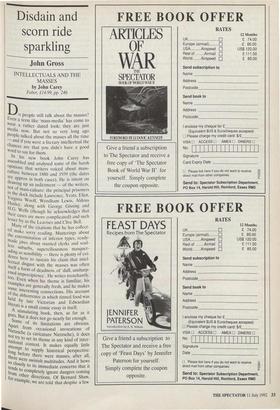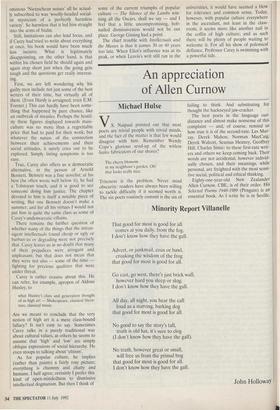Disdain and scorn ride sparkling
John Gross
INTELLECTUALS AND THE MASSES
by John Carey
Faber, £14.99, pp. 246
Do people still talk about the masses? Even a term like `mass-media' has come to
wear a rather dated look; they are just media now. But not so very long ago people talked about the masses all the time — and if you were a literary intellectual the chances are that you didn't have a good word to say for them.
In his new book John Carey has assembled and analysed some of the harsh opinions that writers voiced about mass- culture between 1880 and 1939 (the dates are approx in both cases). He is intent on drawing up an indictment — of the writers, a. ot of mass-culture: the principal prisoners in the dock include Lawrence, Yeats, Eliot Virginia Woolf, Wyndham Lewis, Aldous Huxley, along with George Gissing and H.G. Wells (though he acknowledges that their cases are more complicated) and such lesser fry as the Leavises and Clive Bell. Many of the citations that he has collect- ed make sorry reading. Mutterings about the extermination of inferior types, ready- Made jibes about stunted clerks and soul- less suburbs, superciliousness masquer- ading as sensibility — there is plenty of evi- dence here to sustain his claim that intel- lectual disgust with the masses was often itself a form of deadness, of 'dull, unsharp- ened impercipience'. He writes trenchantly, too, Even when his theme is familiar, his examples are generally fresh, and he makes some interesting connections. His account of the abhorrence in which tinned food was held by late Victorian and Edwardian literati is a small comic essay in itself.
A stimulating book, then, as far as it goes. But it does not go nearly far enough.
Some of its limitations are obvious. A_ part from occasional invocations of Nietzsche (a caricature Nietzsche), it does not try to set its theme in any kind of inter- national context It makes equally little iattempt to supply historical perspective: 0_ lig before there were masses, after all, there were swinish multitudes. And it hews SO Closely to its immediate concerns that it tends to completely ignore dangers coming Timm other directions. Of Bernard Shaw, or example we are told that despite a•few
ominous `Nietzschean noises' all he actual- ly subscribed to was 'woolly-headed social- ist mysticism of a perfectly harmless variety'. So harmless that it led him straight into the arms of Stalin.
Still, limitations can also lend focus, and if Carey had tried to write about everything at once, his book would have been much less incisive. What is legitimately disappointing, on the other hand, is that within his chosen field he should again and again stop short just when the going gets tough and the questions get really interest- ing.
First, we are left wondering why his guilty men include not just some of the best writers of their time, but virtually all of them. (Even Hardy is arraigned; even E.M. Forster.) This can hardly have been some- thing that happened by pure chance, like an outbreak of measles. Perhaps the hostil- ity these figures displayed towards mass- culture was no more than a regrettable price that had to paid for their work; but whatever the naturt of the connection between their achievements and their social attitudes, it surely cries out to be explored. Simply listing symptoms is too easy.
True, Carey also offers us a democratic alternative, in the person of Arnold Bennett. Bennett was a fine novelist; at his best (he often wrote well below it), he had a Tolstoyan touch, and it is good to see someone doing him justice. The chapter devoted to him is itself a notable piece of writing. But one Bennett doesn't make a
summer; and for all his virtues I would not put him in quite the same class as some of Carey's undemocratic villains.
There remains the further question of whether many of the things that the intran- sigent intellectuals found cheap or ugly or barbarrus or degrading were not precisely that. Carey leaves us in no doubt that many of their prejudices were arrogant and unpleasant; but that does not mean that they were not also — some of the time — fighting for precious qualities that were under threat.
Carey is rather evasive about this. He can refer, for example, apropos of Aldous Huxley, to
what Huxley's class and generation thought of as high art — Shakespeare, classical litera- ture, classical music.
Are we meant to conclude that the very notion of high art is a mere class-bound fallacy? It isn't easy to say. Sometimes Carey talks in a purely traditional way about cultural values, at others he seems to assume that 'high' and 'low' are simply oblique expressions of social hierarchy. He even stoops to talking about 'elitism'.
As for popular culture, he implies (rather than paints) a fairly rosy picture; everything is chummy and chatty and humane. I half agree; certainly I prefer this kind of open-mindedness to dismissive intellectual dogmatism. But then I think of
some of the current triumphs of popular culture — The Silence of the Lambs win-
ning all the Oscars, shall we say and I feel that a little uncompromising, hob- nailed dismissiveness would not be out place. George Gissing had a point.
The chief trouble with Intellectuals and the Masses is that it comes 30 or 40 years too late. When Eliot's influence was at its peak, or when Leavis's writ still ran in the universities, it would have seemed a blow for tolerance and common sense. Today, however, with popular culture everywhere in the ascendant, not least in the class- room, it seems more like another nail in the coffin of high culture; and as such there will be plenty of people waiting to welcome it. For all his show of polemical defiance, Professor Carey is swimming with a powerful tide.



















































 Previous page
Previous page